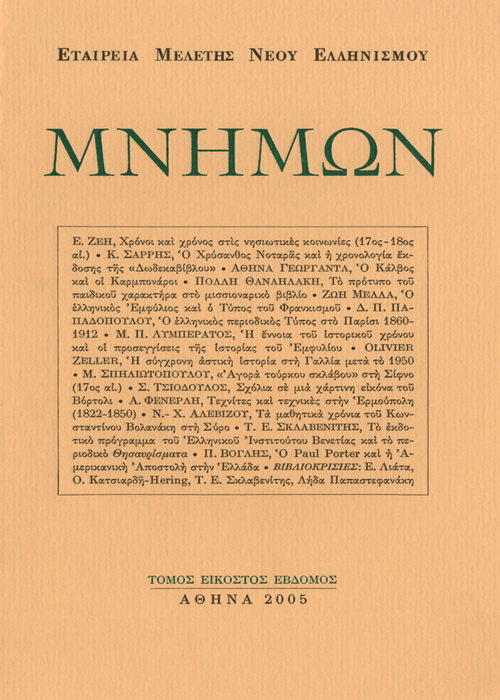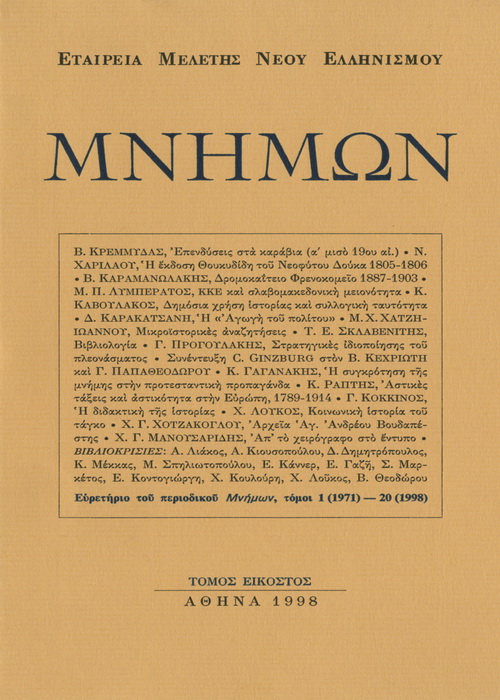Η ΕΝΝΟΙΑ TOΥ ΙΣΤΟΡΙΚΟΥ ΧΡΟΝΟΥ ΚΑΙ ΟΙ ΠΡΟΣΕΓΓΙΣΕΙΣ ΤΗΣ ΙΣΤΟΡΙΑΣ ΤΟΥ ΕΜΦΥΛΙΟΥ ΠΟΛΕΜΟΥ. ΖΗΤΗΜΑΤΑ ΜΕΘΟΔΟΛΟΓΙΑΣ
Abstract
Michalis P. Liberatos, Historical Time and the interpretations of the history of the Greek Civil War: the methodological problems
The idea of historical time is crucial from a methodological point of view as far as the study of political and social history are concerned. Especially about the history of the Greek Civil War, a period that convulsed public opinion and caused scientific interpretations overwhelmed by ideological and epistemological «burdens». The most important of them is the idea of a time constant, continual, without turnovers and breaks, that is time in the «common sense». This «time», according to its origins, self-determines its evolution, its «determination» explains all of the aspects and the historical stages and facts. This is the traditional assumption that change has always to be explained in terms of something fixed and unchangeable. As for the policy of the Greek Communist Party this notion of time provokes some historians to an explanation that associates this policy with the origins of its philosophical program and not with the «real history». This approach avoids to enquiry into the adaptation of this program to the demands of political relations in time, to counter policies and as a specification of social representations. It is mainly an unaltered policy that arises as the outcome of an assemblage of antecedent events that compose a passage of identities. Because of this domination of this notion of the «continuity» of time, the study of Greek Civil War reproduced the ideological configurations of the past. Therefore it has degraded very important aspects of historical reality, without giving adequate answers about them. These are the question of the deepest tasks of KKE and its strategy, the causes of the unscheduled creation of Democratic Army (ΔΣΕ) in the mountains, the role of the rival political powers, the extent of the possibilities of a negotiation, the relation between Greeks and the Great Powers. As the recent historical enquiries has showed —the edition of a book of Ph. Iliou signalled a new era in the interpretation of this period— a different methodological attitude is perhaps primarily useful on account of the errors it enables one to avoid, in particular in constructing the historical object. This article presents the implication between the dominant notion of «time», the difficulties in explanations and with the ability to overcome the epistemological «burdens» if is to be called into question the idea of historical time. This is important in order to break away from some presuppositions that are tacitly accepted by some historians. This new notion of time sweeps away the naively idealistic view of continuity, that traditional approaches have raised. Because it is history and the internal dynamic which carries evolution and not the historical unchanged «purposes».
Article Details
- How to Cite
-
ΛΥΜΠΕΡΑΤΟΣ Μ. Π. (2005). Η ΕΝΝΟΙΑ TOΥ ΙΣΤΟΡΙΚΟΥ ΧΡΟΝΟΥ ΚΑΙ ΟΙ ΠΡΟΣΕΓΓΙΣΕΙΣ ΤΗΣ ΙΣΤΟΡΙΑΣ ΤΟΥ ΕΜΦΥΛΙΟΥ ΠΟΛΕΜΟΥ. ΖΗΤΗΜΑΤΑ ΜΕΘΟΔΟΛΟΓΙΑΣ. Mnimon, 27, 181–214. https://doi.org/10.12681/mnimon.816
- Issue
- Vol. 27 (2005)
- Section
- ARTICLES




